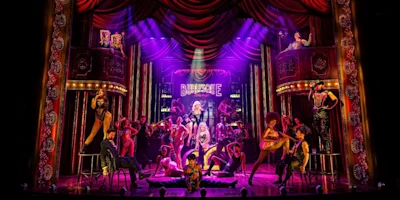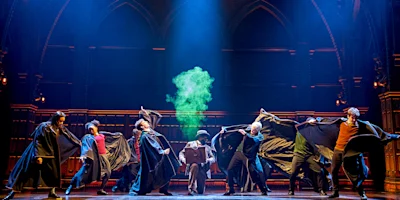
The Best Quotes from Shakespeare's Comedies
With no shadow of a doubt, William Shakespeare is the greatest British playwright that has ever lived. Having penned dozens of comedies, tragedies, and histories, Shakespeare's plays have been repeatedly staged in London for centuries. Even today, new adaptations and traditional tales draw crowds from all over the world, all looking to get their Shakespeare fix.
It's also true that Shakespeare changed the English language. His unique way with words are both powerful, but can also be hilarious when taken out of context. Here's some of our top comedy quotes and comedy insults from Shakespeare plays.
A Midsummer Night's Dream
"I must to the barber's, monsieur; for methinks, I am marvellous hairy about the face: and I am such a tender ass, if my hair do but tickle me, I must scratch."
A Midsummer Night's Dream, Act 4, Scene 1
When Bottom speaks of himself in the forest, it sounds as if he's concerned about his appearance. Actually, he's actually sharing his accomplishments with the other fairies, however silly it sounds.
All's Well That Ends Well
"Virginity breeds mites, much like a cheese."
All's Well That Ends Well, Act 1, Scene 1
In this opening scene, Parolles and Helen chat about the importance of virginity in sixteenth-century society, with Parolles stressing his belief that women shouldn't save themselves. Then, he comes out with this comedic line, referring to the conscious choice of abstinence as breeding mites like a cheese. Even if the conversation isn't laughworthy, comparing a state of person to cheese is.
"It is like a barber's chair that fits all buttocks, the pin-buttock, the quatch-buttock, the brawn-buttock, or any buttock."
All's Well That Ends Well, Act 3, Scene 2
In a scene between the Clown and Countess, the Clown analogises an all-encompassing answer through a barber's chair. A barber's chair does see a lot of action, so it makes sense.
"No legacy is so rich as honesty."
All's Well That Ends Well, Act 3, Scene 5
In context of Shakespeare's play, this legacy is rich; it's actually talking about a young woman losing her virginity. But, when taken out of context, this is a thought that could improve all of our lives.
As You Like It
"I do desire we may be better strangers."
As You Like It, Act 3, Scene 2
Best to pocket this phrase for when we meet people after a trilogy of lockdowns. At least when you tell someone, you can say you're quoting Shakespeare.
Coriolanus
"More of your conversation would infect my brain."
Coriolanus, Act 2, Scene 1
This line comes towards the end of Menenius' monologue, almost as if he's done speaking with anyone that's not on his level. It's a good one to use if you don't want to speak with someone.
Henry IV
"Away, you starvelling, you elf-skin, you dried neat's-tongue, bull's-pizzle, you stock-fish!"
Henry IV Part 1, Act 2, Scene 4
Rolling five insults in one, this hilarious line comes from Falstaff, using different phrases because there isn't enough breath to limit everything he wants to say. It's an oddly-worded sentence that harks to using antiquated insults.
"There's no more faith in thee than in a stewed prune."
Henry IV Part 1, Act 3, Scene 3
Falstaff's choice of words to a mistress aren't exactly courteous. In modern vernacular, Falstaff would be saying how unfaithful she is, but to describe someone as a "stewed prune" is definitely a stand-out comedic insult that should be used more.
"You are as a candle, the better burnt out."
Henry IV Part 2, Act 1, Scene 2
Chief Justice comments on Falstaff's state by likening him to a used candle that's only got half its energy left.
"His wit's as thick as a Tewkesbury mustard."
Henry IV Part 2, Act 2, Scene 4
In centuries gone by, Tewkesbury mustard was used in medicinal remedies. A staple condiment, everyone knew how to use it. So, to call someone as thick as Tewkesbury mustard is to imply they lack any intelligence.
Henry V
"Thou damned and luxurious mountain goat."
Henry V, Act 4, Scene 4
No, someone is not being called the "greatest of all time" as goat can commonly stand for today. This quote is instead calling someone a lazy, unappealing creature.
"Thine face is not worth sunburning."
Henry V, Act 5, Scene 2
Translating this line into modern times, it suggests that you're so ugly, the sun shouldn't even warm your face. Ouch. What a stinger.
Macbeth
"What you egg!"
Macbeth, Act 4, Scene 2
A cracking insult from William Shakespeare here, spoken by a murderer in Macbeth.
"Thou cream faced loon."
Macbeth, Act 5, Scene 3
No, this isn't referring to an individual as a cream cake. It's actually spoken by Macbeth, telling a servant that's he so cowardly, his face is pale as clouds and covered in goosebumps. In fact, he should go to hell and be burned black.
The Merry Wives of Windsor
"You Banbury cheese!"
The Merry Wives of Windsor, Act 1, Scene 1
Once made in Oxfordshire, the production of Banbury cheese is now a thing of the past. Its Shakespearean mention has resurrected the cheese type, used against Slender for their thin, meagre proportions.
"The rankest compound of villainous smell that ever offended nostril."
The Merry Wives of Windsor, Act 3, Scene 5
This is a pretty simple one to understand. Somebody smells so much that they stink.
The Tempest
"Now I will believe that there are unicorns..."
The Tempest, Act 3, Scene 3
Okay, so we know that unicorns don't exist. But imagine if they did. It would be pretty cool, wouldn't it? Well, writers have been dreaming of unicorns for centuries. This fantastical creature is referenced three times in Shakespearean works, with Sebastian using the animal as a way to say that he'll only believe an event if unicorns exist.
Twelfth Night
"If music be the food of love, play on."
Twelfth Night, Act 1, Scene 1
Arguably one of Shakespeare's best-known lines, it's pretty literal. Orsino wants music to play so that he can be successful in his courtship. Its naivety makes it laughable too, but in a sweet and innocent way.
Photo credit: Open book (Photo by Jonas Jacobsson on Unsplash)
Originally published on









